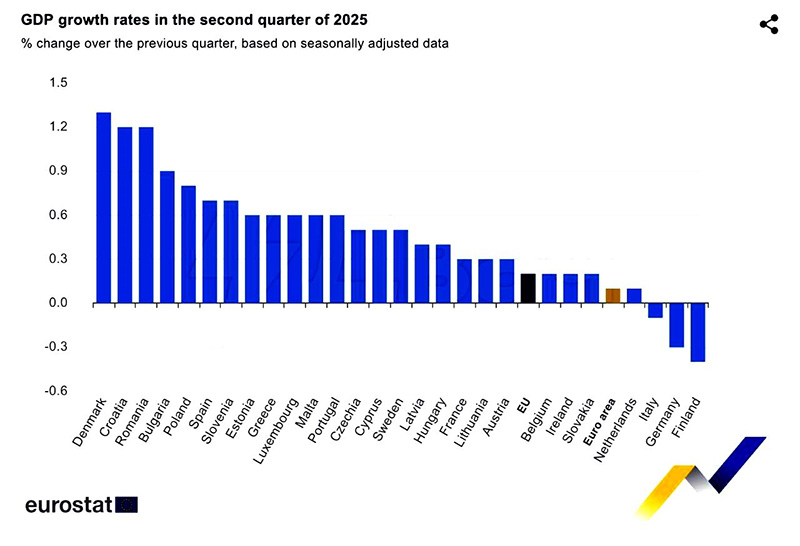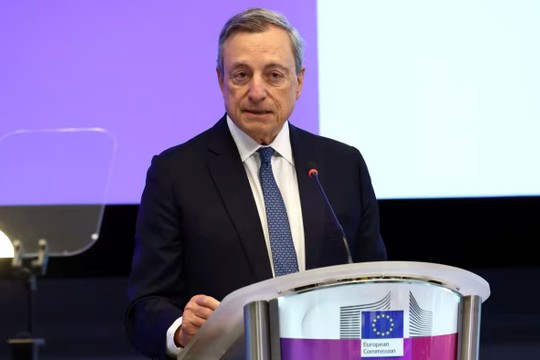Mario Draghi: ‘We have been reminded, painfully, that inaction threatens not only our competitiveness but our sovereignty itself’.
Photo: Reuters
Former Italian PM frustrated with ‘inaction’ a year after his report on how to improve Europe’s competitiveness, Bloomberg reports.
The European Union is moving too slowly in its efforts to boost economic competitiveness, according to former European Central Bank President Mario Draghi.
Draghi said Europeans are "disappointed" by the pace of change and that the EU is failing to keep up with global rivals, calling on the EU countries to act together.
Draghi proposed a detailed plan to strengthen the EU's global position, including embracing common debt and fast-tracking the review of competition rules to promote innovation and consolidation.
The European Union is moving too slowly in its efforts to boost economic competitiveness, with the region “failing to match the speed” of a changing global order, former European Central Bank President Mario Draghi said.
“Too often, excuses are made for this slowness,” Draghi told reporters in Brussels Tuesday at an event marking the anniversary of the report. “A different path demands new speed, scale and intensity,” he said, calling on the EU countries to act together.
Draghi, who also served a stint as Italy’s prime minister, proposed a detailed plan to strengthen the EU’s global position amid the disintegration in transatlantic ties, China’s emergence as a superpower and Russia’s war on Ukraine.
The economist recalled many of his proposals on energy and technology, warning against burdensome regulations in areas such as artificial intelligence, while defending calls in some member states for embracing common debt.
“Joint issuance would not magically expand fiscal space,” he said. “But it would allow Europe to finance larger projects in areas that lift productivity — breakthrough innovation, scale technologies, defense R&D or energy grids — where fragmented national spending can no longer deliver.”
A year ago, Draghi made an urgent call to adopt a set of recommendations and bring the bloc out of its “slow agony,” hampered by internal barriers in the energy and telecommunication markets, financial services or defense production.
In order to catch up with the US and China, the EU’s largest trading partners and economic rivals, he said Europe needed an additional €800 billion ($945 billion) of investments annually.
Mario Draghi has warned that the EU’s economic competitiveness is on the retreat due to “inaction” by Brussels and national capitals, a year after the former Italian premier set out recommendations on how to close the gap with global rivals such as the US and China.
“One year on, Europe is... in a harder place,” Draghi told a news conference on Tuesday. “Our growth model is fading. Vulnerabilities are mounting... and we have been reminded, painfully, that inaction threatens not only our competitiveness but our sovereignty itself.”
“Too often, excuses are made for this slowness. We say it is simply how the EU is built. Sometimes inertia is even presented as respect for the rule of law,” Draghi added. “That is complacency.”
Ursula von der Leyen, the commission’s president, who asked Draghi to write the report, admitted that the EU lacked “urgency” in advancing the competitiveness agenda.
“Our single market is far from complete... It should not be easier to find fortune across an ocean than across European borders,” she said. “We need urgent action to face urgent needs. Because our companies and workers can no longer wait.”
She pointed to a still-pending overhaul of the bloc’s merger rules and called on her competition chief, Teresa Ribera, to speed up the process. The lack of clarity on one of Draghi’s key recommendations has sown uncertainty and frustrated industry and executives, who are waiting for signs from Brussels before making investment decisions.
“We will have to advance the publication of the merger guidelines. I think it’s now time to deliver”, said von der Leyen.
“We must move beyond broad strategies and backloaded time lines,” Draghi said in comments that followed von der Leyen.
Draghi, who also served as president of the European Central Bank, was tasked by the European Commission to put forward a report on the bloc’s competitiveness in September last year. His 383 recommendations were adopted by the commission as a framework for overhauling the EU economy, but just a fraction of them have been implemented since, with the rest mired in political disagreement and bureaucratic wrangling.
According to a study put forward by think tank EPIC only around 11% of the 383 recommendations, or 43 measures, put forward by the Draghi report have been fully delivered, while about 20% have been partially implemented, ‘Financial Times’ remarks.
Despite pledges to move quickly on Draghi’s suggestions, only 11.2 per cent of his ideas have been implemented over the past year, according to the European Policy Innovation Council, a Brussels-based think-tank. At the same time, Europe’s economy has continued to flatline, with the US economy expanding eight times faster than the EU’s in the second quarter of 2025.
European officials have argued that von der Leyen and national EU leaders have been distracted with averting a trade war with the US, keeping Donald Trump’s administration engaged on Ukraine and striking the right balance with China.
But Draghi warned that “Europe’s citizens and companies... express growing frustration. They are disappointed by how slowly the EU moves. They see us failing to match the speed of change elsewhere. They are ready to act, but fear governments have not grasped the gravity of the moment.”
Deutsche Bank assessed in a report that progress has been mixed, with more momentum in scaling up the defense industry given the sense of urgency in European capitals from the war in Ukraine and a softening commitment to the region’s security from the US.

read more in our Telegram-channel https://t.me/The_International_Affairs

 10:27 18.09.2025 •
10:27 18.09.2025 •























